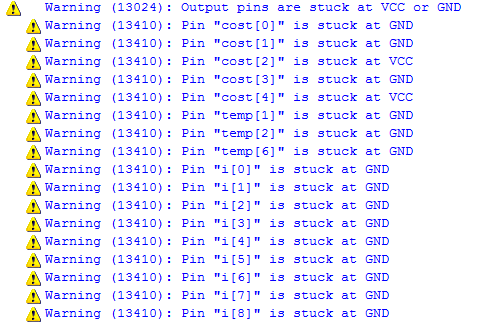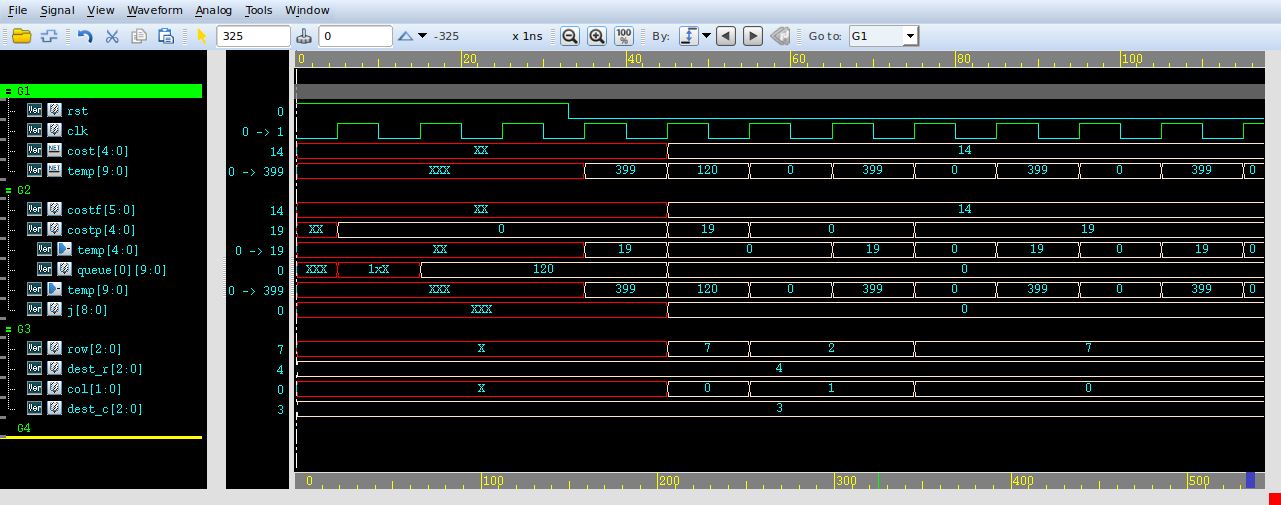I am planning to implement a maze routing program using Lee's algorithm. After searching some online resources, it seems that it requires a queue implementation for the BFS to work. After storing the queue values in the register:
reg[9:0] queue[0:19];
...............
temp<=queue[0];
if(temp!= 0)begin
j<=0;
row<=temp[9:7];
col<=temp[6:5];
costp<=temp[4:0];
The control should go inside the if condition as the queue doesn't contain any zeros. But instead the control goes to the following prescript every time:
else begin
temp<= 10'b 1110011001;
error<=1;
end
Is it because my queue is not being processed correctly? For dequeuing the first queue input, I am using the following prescript:
queue[0]<=queue[1];
queue[1]<=queue[2];
queue[2]<=queue[3];
queue[3]<=queue[4];
queue[4]<=queue[5];
queue[5]<=queue[6];
queue[6]<=queue[7];
queue[7]<=queue[8];
queue[8]<=queue[9];
queue[9]<=queue[10];
queue[10]<=queue[11];
queue[11]<=queue[12];
queue[12]<=queue[13];
queue[13]<=queue[14];
queue[14]<=queue[15];
queue[15]<=queue[16];
queue[16]<=queue[17];
queue[17]<=queue[18];
queue[18]<=queue[19];
I am also attaching the full Verilog code that I have written:
module maze_lee(cost,clk,rst,error,temp,i);
input rst,clk;
output wire [4:0]cost;
wire grid[0:4][0:3];// 5x4 grid initialization
//Source and destination declaration
reg [2:0]source_c=3'b 001;
reg [2:0]source_r=3'b 001;
reg [2:0]dest_r= 3'b 100;
reg [2:0]dest_c= 3'b 011;
//declaration ended
reg [2:0]row;
reg [1:0]col;
reg [9:0]queue[0:19];
reg [4:0]costp;
output reg [8:0]i;
assign grid[0][0]=1;
assign grid[0][1]=0;
assign grid[0][2]=1;
assign grid[0][3]=1;
assign grid[1][0]=0;
assign grid[1][1]=1;
assign grid[1][2]=1;
assign grid[1][3]=0;
assign grid[2][0]=1;
assign grid[2][1]=1;
assign grid[2][2]=0;
assign grid[2][3]=1;
assign grid[3][0]=0;
assign grid[3][1]=1;
assign grid[3][2]=1;
assign grid[3][3]=1;
assign grid[4][0]=1;
assign grid[4][1]=0;
assign grid[4][2]=1;
assign grid[4][3]=1;
//maze declaration ended
//Visited 2D array to check whether the respective grid has been visited or not
reg visited[4:0][3:0];
//direction array defined
wire signed [2:0]x[0:3];
wire signed [2:0]y[0:3];//signed type has to be used as the arrays values can be negative;
//Direction definer
assign x[0]=0;
assign x[1]=-1;
assign x[2]=1;
assign x[3]=0;
assign y[0]=-1;
assign y[1]=0;
assign y[2]=0;
assign y[3]=1;
//declaration of direction definer changed
output reg [9:0]temp;
reg [8:0]j;// index counter of the direction definer array.
output reg error;
reg temp11,temp21,temp31,temp41;
reg temp12,temp22,temp32,temp42;
reg [5:0]costf;
always@(posedge clk) begin
if(rst)begin
costp<=0;
i<=0;
queue[0]<={source_r,source_c,costp};
queue[1]<=10'b 0000000000;
queue[2]<=10'b 0000000000;
queue[3]<=10'b 0000000000;
queue[4]<=10'b 0000000000;
queue[5]<=10'b 0000000000;
queue[6]<=10'b 0000000000;
queue[7]<=10'b 0000000000;
queue[8]<=10'b 0000000000;
queue[9]<=10'b 0000000000;
queue[10]<=10'b 0000000000;
queue[11]<=10'b 0000000000;
queue[12]<=10'b 0000000000;
queue[13]<=10'b 0000000000;
queue[14]<=10'b 0000000000;
queue[15]<=10'b 0000000000;
queue[16]<=10'b 0000000000;
queue[17]<=10'b 0000000000;
queue[18]<=10'b 0000000000;
queue[19]<=10'b 0000000000;
visited[0][0]<=0;
visited[0][1]<=0;
visited[0][2]<=0;
visited[0][3]<=0;
visited[1][0]<=0;
visited[1][1]<=0;
visited[1][2]<=0;
visited[1][3]<=0;
visited[2][0]<=0;
visited[2][1]<=0;
visited[2][2]<=0;
visited[2][3]<=0;
visited[3][0]<=0;
visited[3][1]<=0;
visited[3][2]<=0;
visited[3][3]<=0;
visited[4][0]<=0;
visited[4][1]<=0;
visited[4][2]<=0;
visited[4][3]<=0;
end
else begin
temp<=queue[0];
if(temp!= 0)begin
j<=0;
row<=temp[9:7];
col<=temp[6:5];
costp<=temp[4:0];
error<=0;
if((row==dest_r)&&(col==dest_c))costf<=costp;
else begin
costf<=20;
temp11<=grid[row+x[0]][col+y[0]];
temp21<=grid[row+x[1]][col+y[1]];
temp31<=grid[row+x[2]][col+y[2]];
temp41<=grid[row+x[3]][col+y[3]];
temp12<=visited[row+x[0]][col+y[0]];
temp22<=visited[row+x[1]][col+y[1]];
temp32<=visited[row+x[2]][col+y[2]];
temp42<=visited[row+x[3]][col+y[3]];
if(((temp11==1)||(temp12==0))&&((row+x[0]>=0 && row+x[0]<=4)&&(col+y[0]>=0&&col+y[0]<=3)))begin // checks the validity of the left posistions
j<=j+1;
queue[i+j]<={(row+x[0]),(col+y[0]),costp+1};
visited[row+x[0]][col+y[0]]<=1;
end
if(((temp21==1)||(temp22==0))&&((row+x[0]>=0 && row+x[0]<=4)&&(col+y[0]>=0&&col+y[0]<=3)))begin // checks the validity of the up posistions
j<=j+1;
queue[i+j]<={(row+x[1]),(col+y[1]),costp+1};
end
if(((temp31==1)||(temp32==0))&&((row+x[0]>=0 && row+x[0]<=4)&&(col+y[0]>=0&&col+y[0]<=3)))begin // checks the validity of the right posistions
j<=j+1;
queue[i+j]<={(row+x[2]),(col+y[2]),costp+1};
end
if(((temp41==1)||(temp42==0))&&((row+x[0]>=0 && row+x[0]<=4)&&(col+y[0]>=0&&col+y[0]<=3)))begin // checks the validity of the down posistions
j<=j+1;
queue[i+j]<={(row+x[3]),(col+y[3]),costp+1};
end
i<=i+j;
visited[row][col]<=1;
// Time to dequeu the visited the grid.Confusion on whether to dequeue using Bruteforce method for now do it
queue[0]<=queue[1];
queue[1]<=queue[2];
queue[2]<=queue[3];
queue[3]<=queue[4];
queue[4]<=queue[5];
queue[5]<=queue[6];
queue[6]<=queue[7];
queue[7]<=queue[8];
queue[8]<=queue[9];
queue[9]<=queue[10];
queue[10]<=queue[11];
queue[11]<=queue[12];
queue[12]<=queue[13];
queue[13]<=queue[14];
queue[14]<=queue[15];
queue[15]<=queue[16];
queue[16]<=queue[17];
queue[17]<=queue[18];
queue[18]<=queue[19];
end
end
else begin
temp<= 10'b 1110011001;
error<=1;
end
end
end
assign cost=costf;
endmodule
The main issues I am receiving is that the outputs are grounded completely. That can be seen from the following screenshot.
I ran simulation on Altera's University Waveform program, and yes, the output was always at constant zero. I expect cost to change because inside the if statement that I have stated at the start of the body, there is cost increase whenever clock pulse covers one time period. But instead, it is constant. The main output is cost because it will determine the shortest path in the desired algorithm.
Any help will be greatly appreciated.


